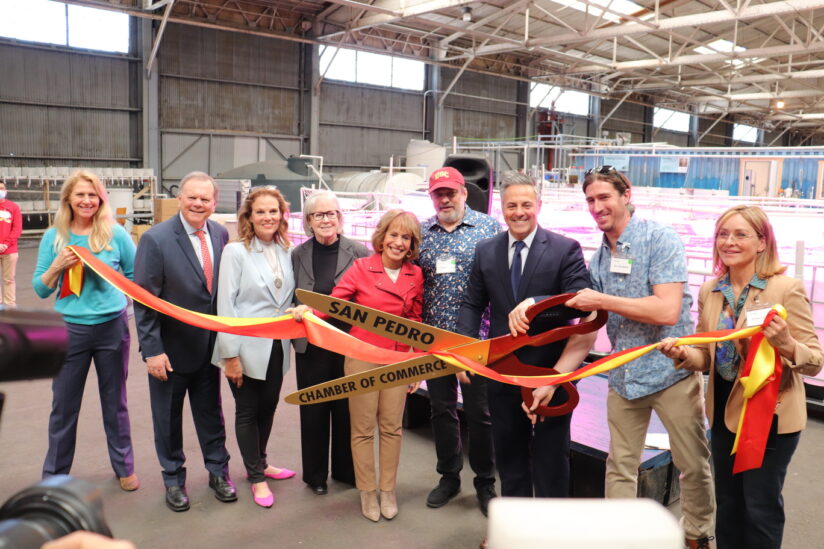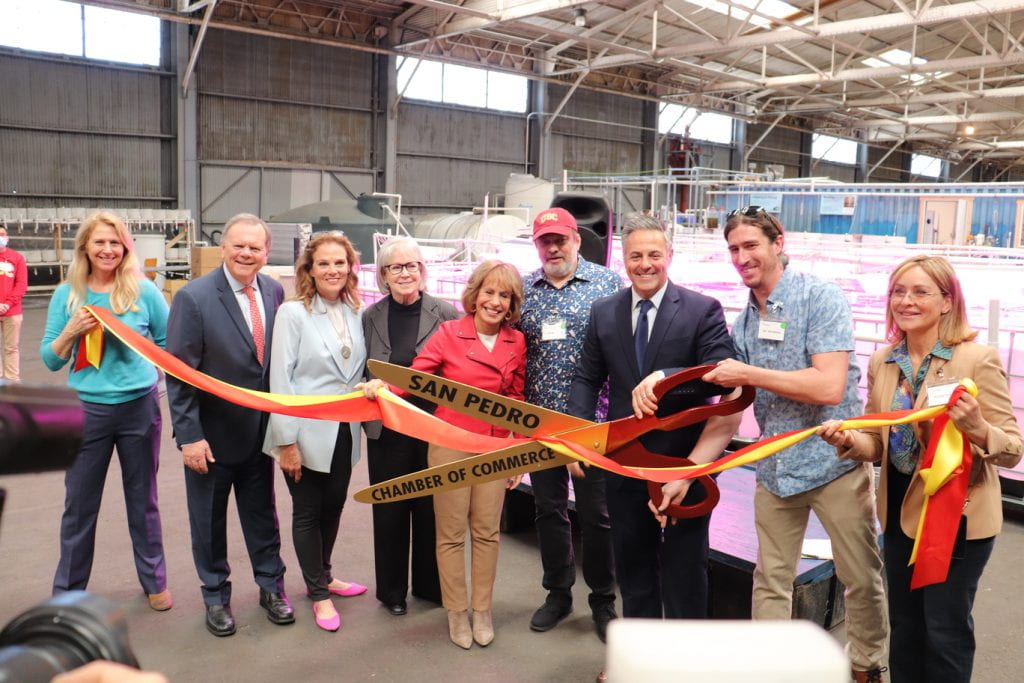USC celebrates a new lab with research accelerator AltaSea — a project that may one day help California grow stronger, healthier mussels, oysters and kelp that can withstand the effects of global warming.
BY Emily Gersema MARCH 7, 2022

USC is diving into aquaculture, working with a growing research accelerator near the Port of Los Angeles so that researchers can focus on strengthening the survivability of farmed oysters, mussels and giant kelp to help them and the food supply thrive.
On Monday, USC and AltaSea celebrated the opening of a set of new aquaculture labs in AltaSea’s warehouse on a 35-acre property in San Pedro. Part of the so-called “blue economy,” AltaSea is working with researchers and businesses to tap into ocean resources in sustainable ways and enhance ocean plants and fishes’ resilience to climate change.
The USC Dornsife’s Nuzhdin Aquaculture Lab has an area of 24 tanks. Some are dedicated to the cultivation of giant kelp for research on its potential as a biofuel and food resource. Another portion of the lab holds large tanks where graduate students are raising oysters and mussels.
Looking out at a crowd of more than 150 people that included 10 students in Professor Sergey Nuzhdin’s lab, USC President Carol L. Folt said: “We are the start of an army. … We get to drive the blue economy, sustainability. The oceans not only hold the diversity of life, but they produce the oxygen that goes into the atmosphere. Aquaculture will be part of the ways that we feed the planet, and we will do it in a way that is sustainable.”
Jordan Chancellor, a PhD student working in Nuzhdin’s lab at AltaSea, has started growing oysters and mussels to test them under stressful conditions. She aims to identify and study those genes that make them especially resilient to the extremes wrought by climate change or other changes in the water’s chemistry. The work involves some biology, some genetics and a lot of computational biology — applying computing to assess and analyze the data she gathers on the shellfish.
Though Chancellor knows the work is important for her degree, she is more excited that her research may have a role in ensuring a more stable food supply in the face of immense environmental change.
Her work could help seafood farmers in California’s $200 million growing aquaculture trade produce more sustainable types of mussels and oysters. A resilient shellfish population could reduce uncertainties in supply, a problem for fisherman depending on natural shellfish populations.
Kelp, another fast-growing aquaculture, is gaining wider popularity as a climate-friendly vegetable and seasoning agent. It has even been used for producing edible coatings that safely encase pills or vitamins. More recently, kelp has demonstrated its potential as a source for biofuel in recent studies led by Diane Young Kim, a professor of environmental sciences at USC Dornsife’s Wrigley Institute for Environmental Studies.
“We are looking at the giant kelp genome to see what genes make it big,” said Anupam Singh, who recently earned her PhD and studies giant kelp in Nuzhdin’s lab. “Biomass is the key.”
Kelp also is one of the most important food sources for sustaining and sheltering ocean life, including shellfish raised on aquaculture farms along the California coast.
Folt noted that the survival of kelp is a concern. Much of the world’s kelp forests in recent years have been sickened and killed by ocean warming and spikes in acidity.
AltaSea is supported by USC alumni and philanthropists Melanie and Richard Lundquist. Melanie Lundquist, a member of the USC Rossier School of Education Board of Councilors, said that when she learned about AltaSea, she could immediately foresee its potential for helping research that could save species, improve sustainability, grow food and build a new economy.
The Lundquists gave $5 million, drawn by the interest and vision of Leonard Aube, the late executive director of the Annenberg Foundation who passed away in 2015. Lundquist called Aube the driving force behind AltaSea.
“This is not just for Len,” she said. “It’s for the bigger picture of what AltaSea could become for our kids’ and our planet’s future.”
The lab openings at AltaSea were also supported by federal grants from the U.S. Department of Agriculture and NOAA Sea Grant.
Members of the Gabrielino-Tongva Indian Tribe performed a Chumash elder blessing for the ocean at the AltaSea ribbon-cutting for the new labs.
“There is so much damage that has occurred on our Earth waters in a very short amount of time,” said Tina Calderon. “From the whales … to the tiniest little microbes, they have their rights. Let’s use our scientific minds for good.”
Former Gov. Arnold Schwarzenegger who founded the USC Schwarzenegger Institute for State and Global Policy at the USC Price School for Public Policy also attended briefly via Zoom, supporting the grand opening led by AltaSea CEO Terry Tamminen, the former secretary of the California Environmental Protection Agency. Schwarzenegger said it was time to “terminate” climate change.
More stories about: Sustainability
